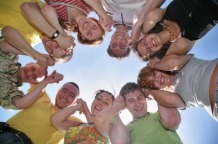What is Adventure-Based Education?
|
Adventure-Based Learning (also known as experiential education) is based on the concept that children learn effectively when they:
· are interested in what they are learning · are actively participating in their learning · feel a sense of control over what they are learning · reflect on the experience afterward · make connections to other learning and life situations. |
Here's How it Works
Have you ever tried something that you thought you weren't capable of doing, or solved a problem that at first intimidated you and therefore you procrastinated? Remember how it felt to overcome the fear and intimidation? Did this success feel empowering and help you learn something about yourself, or others?
In adventure-based learning programs the teacher or facilitator challenges a group to achieve a goal, but does not explain how to successfully complete the challenge. Students must work to find a solution individually and together as a team, and must communicate and learn from each other in order to be successful.
Students begin to recognize the inner resources, strengths, and positive qualities within themselves and within their team. Reflecting and debriefing on the experience or "adventure" afterward allows them to learn more about both their personal behavior and contributions as well as the group's, and relate it back to their everyday lives and routines to create positive change.
Positive change often occurs when students, individually and in groups, face problem-solving or safe risk-taking situations. Adventure-based learning programs have proven to be successful in meeting both educational and personal goals.
The Adventure Begins Here!
In adventure-based learning programs the teacher or facilitator challenges a group to achieve a goal, but does not explain how to successfully complete the challenge. Students must work to find a solution individually and together as a team, and must communicate and learn from each other in order to be successful.
Students begin to recognize the inner resources, strengths, and positive qualities within themselves and within their team. Reflecting and debriefing on the experience or "adventure" afterward allows them to learn more about both their personal behavior and contributions as well as the group's, and relate it back to their everyday lives and routines to create positive change.
Positive change often occurs when students, individually and in groups, face problem-solving or safe risk-taking situations. Adventure-based learning programs have proven to be successful in meeting both educational and personal goals.
The Adventure Begins Here!
